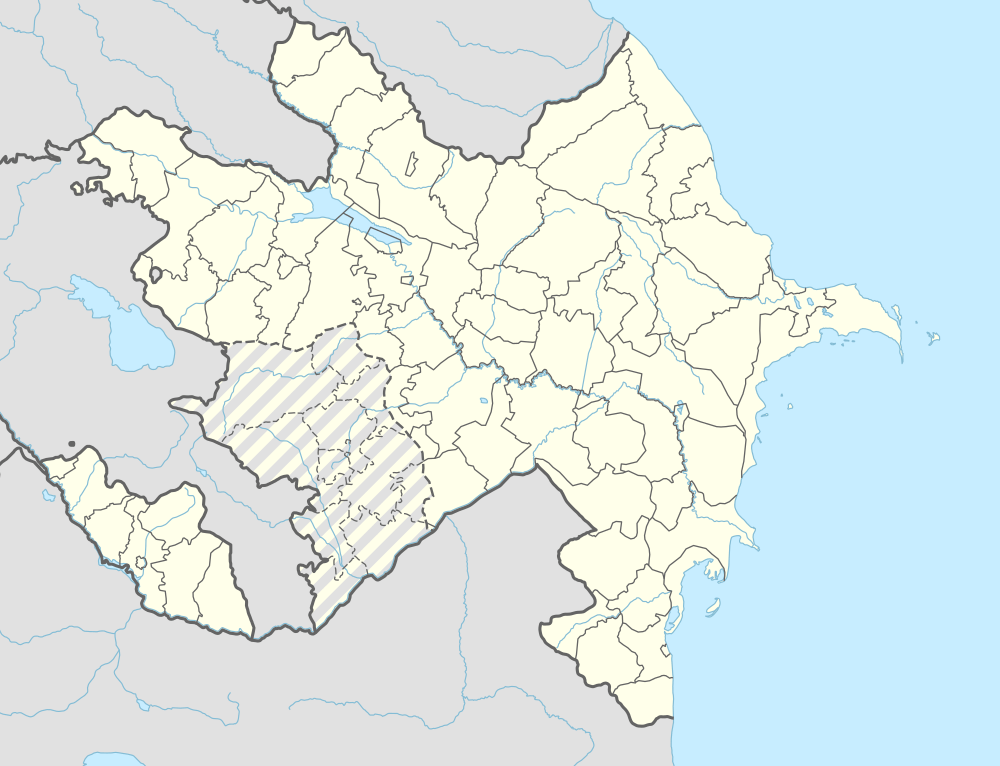Aşağı Əylis
| Aşağı Əylis | |
|---|---|
| Municipality | |
 Aşağı Əylis | |
| Coordinates: 38°55′11″N 45°59′11″E / 38.91972°N 45.98639°ECoordinates: 38°55′11″N 45°59′11″E / 38.91972°N 45.98639°E | |
| Country |
|
| Autonomous republic | Nakhchivan |
| Rayon | Ordubad |
| Population (2005) | |
| • Total | 1,007 |
| Time zone | AZT (UTC+4) |
Aşağı Əylis (also, Ashaghy Aylis, Ashaga Aylis and Ashagy Aylis) is a village and municipality in the Ordubad Rayon of Nakhchivan, Azerbaijan. It is located in the near the Ordubad-Yuxarı Aylis highway, 3 km in the east from the district center, on the bank of the Aylis River. Its population is busy with gardening, farming, animal husbandry. There are secondary school, club and a medical center in the village. It has a population of 1007.[1]
Etymology
Some ideas is put forward by various authors about the name of Əylis. According to the doctor of philological sciences Adil Bagirov: "There are two villages, Ashaghy Aylis and Yukhary Aylis in the Ordubad region. These names were registered Aylis and Sahraoui-Aylis villages in 1590, in 1727 and in 1728 in the names of the Lower and Upper Aylis ".[2] The associated with the explanation of the toponym, Adil Bagirov quotes from many historical sources that, the name of “Əylis” deals forms of Əl-Leys, Ağ Kilis, Ağ Ulus and show that, in all cases it is explained in old Turkish.[2] In the early VIII century, in order to spread Islam, one of the most prominent warlords of the Prophet Muhammed, Malik Ibrahim Əl-Leys has come to Ordubad. He took Ordubad and himself settled here. At the present, the city cemetery of the Ordubad known as the holy cemetery, is called "Malik Ibrahim cemetery". In the top side of the cemetery was built the sanctuary. Malik Ibrahim's grave is inside this sanctuary. Thus, the village which was given him as award for his bravery, was named Əl-Leys after him, later as a result of the fall and displacement of the votes, Əl-Leys became Əylis.[3]
The name of Əylis appeared as a result of the displacement with two components words of the ağ-ulus ("agh"-means (white); "ulus"-means (town)), in the local dialects word ağ-ulus changed to ak-ulus-ağulis-əkülüs-əklis-əgülüs-əglüs-Əylis.[4] The ancient Turkic peoples cherished in a private belief to the word of "ağ". In Azerbaijan, there are dozens of place names formed with the participation of the "ağ" (white) component: Aghdara (White valley), Agh Yurd (White Place), Aghbulag (White spring), Aghdam (White Castle), Aghdash (White stone) and etc.[4] In the epigraphic monuments of the village of Əylis, name was written in the form Əklis. In the cemetery of the village, in the epitaph, the penname Əklisi engraved on the one of the grave stone: "The date of death of late Kelbeli ibn Abu Said Aklisi 1174, / AH 1174 = years of 1760-1761."[1] The main reason the fall to the form of Əylis from əkilis-əklis-əgilis-əglis, the toponym of Ağ-ulus was written in Arabic script. Thus, if there was one writing form of the word of ağ-ulus in Arabic, because of not recorded a short vowels in the that alphabet, there were a few kind of reading. It also willy-nilly led to a change of the phonetic composition of the word. In this regard, in certain times using the word of the ağ-ulus as akulus by the Turks, akulis by the Russians, əgilis //əgilis // əklis by the Persians are the natural state.[4]
References
- 1 2 ANAS, Azerbaijan National Academy of Sciences (2005). Nakhchivan Encyclopedia. volume I. Baku: ANAS. pp. 36–37. ISBN 5-8066-1468-9.
- 1 2 Adil Bagirov: Nakhchivan: Toponyms about Nakhchivan in "Kitab-i Dede Qorqud". Baku: ANAS. 2013. p. 369.
- ↑ Arxeoloq, fəlsəfə doktoru Bəhlul İbrahimli: “Əylis kəndi əslində onun adını daşıyır...”
- 1 2 3 Encyclopedic Dictionary of Azerbaijan Toponyms. In two volumes. Vol. I. Baku, "East-West", 2007, 304 p. ISBN 978-9952-34-155-3
.svg.png)